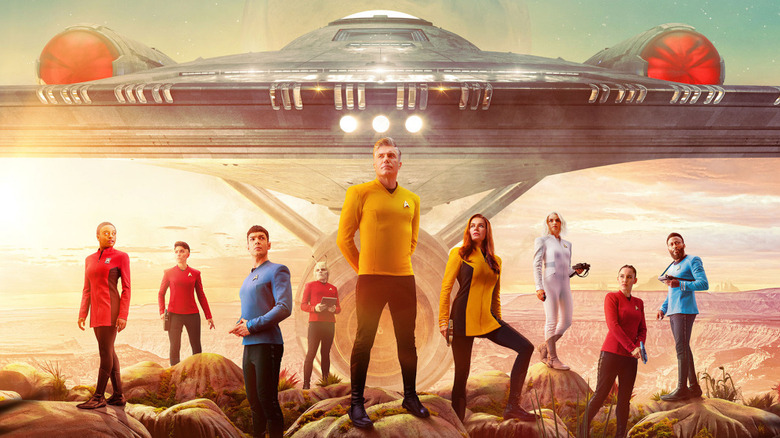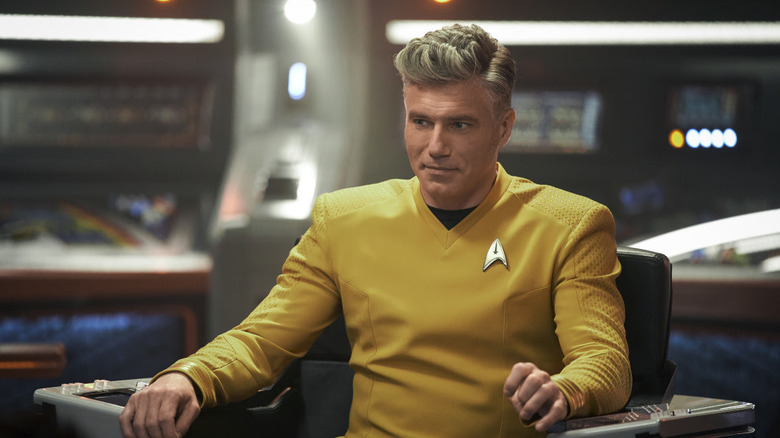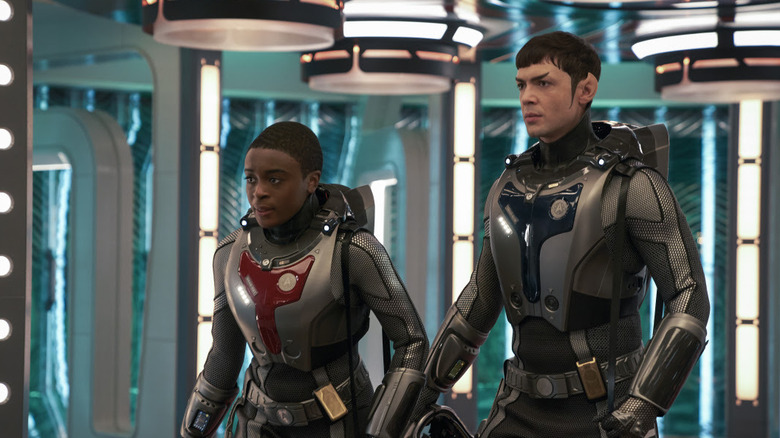Star Trek: Strange New Worlds Review: The Legendary Sci-Fi Franchise Is No Longer Lost In Space
"Star Trek: Strange New Worlds" is the twelfth TV series in the 55-year-old franchise, and the sixth to be released on Paramount+ (if you count "Short Treks" as its own series). Modern "Star Trek" is currently adhering to the modern entertainment ethos of putting all your eggs in one basket. More and more companies are relying on recognizable IP in order to sell their projects, and Paramount leaned into "Star Trek" hard, producing 115 episodes of TV since September of 2017. To the eyes of old-world Trekkies (also known as sticks in the mud), there appeared to be a mandate applied to modern Trek: Make it as different from established canon as possible.
"Discovery" is a bleak, weepy, violent series that eschewed "Trek"'s classical one-hour-morality-play structure in favor of season-long story arcs (as is the typical model of all modern TV). Few of the new "Trek" shows were about Roddenberry's vision of optimism, intelligence, and diplomacy, preferring tales of conflict, war, torture, brainwashing, and genocide. With the proud exception of "Star Trek: Lower Decks" — which acknowledged the basic premise of being a workplace drama — new Trek shows have felt ... off. Like the creators don't really know what they're doing with a technically-inclined show like "Star Trek," nor how to write a story that doesn't lean into violence and pessimism.
The runners of post-'17 "Star Trek," in wanting to create a "This ain't your dad's Trek" version of the show, skewed into convoluted storytelling, clumsy fan service, and ideas that were anathema to the franchise's heyday in the 1990s. This may have been a result of Too Many Cooks getting involved; each episode of "Discovery" and "Picard" each have over 20 credited producers.
One of the aforementioned bouts of clumsy fan service was the appearance of Capt. Christopher Pike (Anson Mount), the captain of the Enterprise prior to Kirk, previously played by Jeffrey Hunter in the unused "Trek" pilot, by Sean Kenney in "The Menagerie," and by Bruce Greenwood in the 2009 "Star Trek" feature film. Pike would play a major role in the second season of "Star Trek: Discovery," taking control of the title ship to search for Spock (Ethan Peck). Mount was so appealing in the role, Trekkies on social media began demanding that he get his own series wherein "Star Trek" could move back aboard the Enterprise, and fans could surround themselves with familiar characters and iconography again.
So that's what Paramount did. And, in returning to a familiar ship, familiar characters (Pike, Spock, Number One, Khan, Uhura, Dr. M'Benga, Nurse Chapel), and Trek's classical and well-worn hour-long episodic format, the franchise has finally reached a point where it is ... however unbelievable it might be ... legitimately good once again. No qualifications are needed any longer. "Strange New Worlds" is, quite simply, the best "Star Trek" show in decades.
Strange New Worlds
It's worth remembering that no "Star Trek" series started at its peak. The first two seasons of "Next Generation" and "Deep Space Nine" experienced growing pains, and multiple episodes featured dodgy writing or strange character choices. "Voyager" didn't pick up in the ratings until the introduction of Seven of Nine (Jeri Ryan) in the fourth season, and some would say "Enterprise" didn't really start kicking until season three. That "Strange New Worlds" is starting as strong as it has is most certainly a promising sign of things to come.
Set aboard the Enterprise — yes, the very same one featured in the 1966 TV series — "Strange New Worlds" follows Capt. Pike and his crew at the beginning of a classic five-year mission. In addition to his science officer Spock, the ensemble includes his first officer Comm. Una Chin-Riley (Rebecca Romijn), his security chief Lt. La'an Noonien-Singh (Khan's granddaughter, played by Christina Chong), his chief medical officer Dr. M'Benga (Babs Olusanmokun), nurse Christine Chapel (Jess Bush), a young cadet named Uhura (Celia Rose Gooding), and two original characters: smirking helm operator Erica Ortegas (Melissa Navia) and chief engineer Hemmer (Bruce Horak) a white-skinned Aenar who cannot see, but who has enhanced senses otherwise.
On a basic level, a new "Star Trek" series needs to establish the setting, who the characters are, how they relate to one another, and the basic premise of the show. "Strange New Worlds" does this remarkably well. The camera dwells in smaller locations for longer amounts of time (when compared to the swirling, location roulette of "Discovery") allowing viewers to understand the geography of the Enterprise well. It now feels like a place where employees might be working. Characters are also allowed to have incidental conversations not pertinent to the plot, giving viewers a better sense of who they are. When we meet characters who are constantly in crisis mode, we don't get to know them too well. "Strange New Worlds" has made great allowances for non-action. For those exhausted by modern "Star Trek" presented at a fever pitch of incident, "Strange New Worlds" feels like Ozu in comparison.
That's how you make new fans.
In including so many legacy characters from the jump, "Strange New Worlds" seems to be under no pressure toward dramatic reveals of known "Trek" iconography. The inclusion of familiar names seems to be enough for the show-runners, allowing them to eschew the usual "legacy sequel" story beats that have become annoying common in the Age of Regurgitation. There are no loving closeups of Starfleet badges or communicators. There are exteriors of the Enterprise, but they do not descend into vehicle fetish. Although "Strange New Worlds" is a direct expansion of known Trek lore, the showrunners seem to have finally dropped the foolish twin pop philosophies of "We're doing this for the fans" and "We're reinventing everything." They found an old recipe, and it still tastes good.
Do it for people who aren't fans. That's how you make new fans.
"Strange New Worlds" is graceful in introducing new information about established characters without contradicting canon nor making their backstories so absurd that a Trekkie would roll their eyes. To reiterate: If a "Star Trek" show is going to begin this strongly establishing its setting and characters with the passion and attention to detail of a '90s Trek show, then we will only have better and better things to look forward to. After several high-profile, big-budget whiffs, "Trek," I'm happy to say, has hit its stride.
"Star Trek: Strange New Worlds" premieres on May 5, 2022, exclusively on Paramount+.


